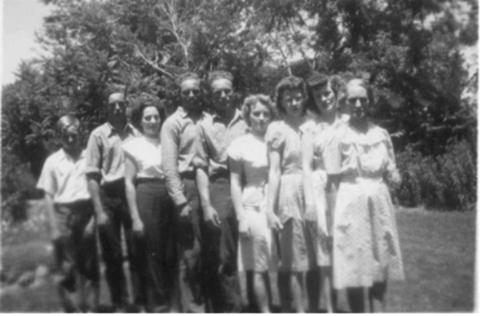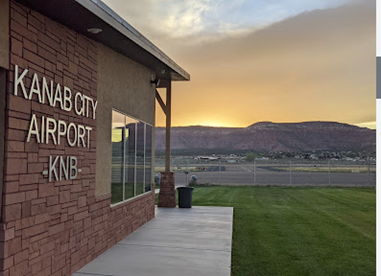“Clara, you know we can’t pay you that much money. You’ll just have to wait, and we’ll pay you as we go.”
“No, Mayor. You started this and I’ll take my money now!”
My grandmother, Clara Spencer, lost her husband in 1933 in the middle of the Great Depression, leaving her with eight children aged seven months to fifteen years and a 116-acre ranch. Hard times breed hard people, and with the help of her children and a large extended family, she was making a living off that land. Then, the city of Kanab served notice they wanted a strip right through the middle of the ranch for an airport.
Never being one to stand in the way of progress, Clara agreed to sell the required land for $100 an acre, which is what the City paid for several smaller adjoining parcels owned by some of the city fathers. Their reply to her offer was, “No, we’ll pay you $25 an acre, and if you don’t like that we’ll condemn it and pay you even less. Take it or leave it!”
That was exactly the wrong thing to say to Clara and the three other widows the city council had assumed would be easy prey. Acting as their own attorneys, “The Ladies” prepared to take on the City Fathers.
Clara and her friends weren’t the first women to question the all-male city leaders.
In 1912, Kanab voters elected a female mayor and an all-female city council and was briefly famous as the first equal-opportunity political city in the country.
https://issuu.com/utah10/docs/uhq_volume73_2005_number4/s/10137115
Clara served for two years as a missionary for the Mormon Church in So. Dakota, Iowa, and Colorado, back when most roads were dirt and missionaries traveled on foot, winter and summer. She then earned a college degree from Brigham Young Academy (now B.Y.U.), married, and moved back to Orderville, where she taught school in a one room schoolhouse. It was often said she displayed “remarkable spunk.”
JUDGMENT of CONDEMNATION
Case Number 435
Kanab City vs Ida Riggs, Elson Riggs, Mrs. Dana Farley & Clara Spencer
The Council hired a big-gun law firm, Cedar City’s Morris and Matheson – Matheson as in Scott, Sr., a lawyer who became governor and whose son became U.S. Attorney for Utah. During the preliminary hearing, the mayor testified the airport was backed by the Lions Club and 80% of Kanab residents.
Local politicians were so confident about the outcome that two months before the trial was scheduled, city workers hired a bulldozer to tear up Clara’s ranch and build a dirt landing strip. A hearing was then held for a “Notice to Occupy” and the sheriff served Clara with papers barring her from most of her ranch. A trial date was set for 10 August, 1947 at 10 A.M.

The battle was on and Clara called in her family. This picture was taken the day before the trial opened and was the first time the family had been together since the start of The War. One of “the twin boys,” Loren, landed on the beach at Iwo Jima, and his twin Cleon (sleeves rolled up) did the same at Normandy. Most of the daughters had married returning G.I.s. As they gathered around the kitchen table the conversation sounded a lot like a battle plan, this time on the home front.
As the trial opened, visiting District Judge John L. Sevy Senior’s first order of business was to sift through the pool of prospective jurors. About noon, the Judge was introduced to one of the defendants, Clara Spencer, and she promptly invited him over to her home for lunch. As the two old college friends from B.Y.A. left arm in arm, stepping over the chins of the City Fathers, someone asked if this wasn’t a “Conflict of Interest?”
“Not as far as I’m concerned, said the judge. “The trial will go on.”
If the Council saw some cracks in the wall they built around Clara, those cracks got wider when the jury pool was called. Everybody knew Clara or was related to her. As one of nine children of a polygamous father, whose other wife had twelve children, all of whom were now having children, plus grandchildren, plus all their in-laws, the odds of finding an impartial jury in Kanab were slim indeed.
Orderville was the only other town of any size in the county, but the same problem remained. Clara had been the teacher in their one room school for years and everyone knew her well.
Finally, some lumber jacks were found on the Kiabab Plateau who were acceptable to both sides, and the trial commenced on Monday, September third, three weeks after the scheduled start date.
The Council presented their case with what one observer described as “much windy testimony.” It took four days for the Council to show that the water table at the Spencer ranch was much too high to grow anything. The Council produced a telephone company employee who testified he had dug a hole for a telephone pole that immediately filled with water, proof that nothing could ever grow on the ranch.
Finally, the Spencers took the stand to present their case. The telephone company employee admitted the hole he dug was in the irrigation ditch bank, while it was flowing water. Since the pole was still there, what could he say. A picture of Loren as a teenager harvesting wheat, and a stand of eight healthy children proved that food could actually be grown and harvested on the ranch. The Spencer defense was swift and effective. The jury retired to make their decision, and in less than an hour they returned with a verdict.

The three women with smaller parcels each received $100 dollars per acre. The jury foreman then caused the blood to drain from the faces of the assembled city fathers when he awarded “special damages” to Clara. Since the airstrip ran right down the center of the ranch, it was obvious that making an “economic unit” of the remaining land would be difficult. Getting irrigation water across the runway would be impossible, so the City had to buy the entire ranch at $100 per acre, plus damages. The total award amounted to thousands of dollars in today’s money. Several of the town’s leading civic and religious leaders spat on the jurors as they left the jury box.
When Clara refused the “pay as we go” offer, a special bond election was held to pay her off. It passed easily.
Occasionally, I visit the Kanab Airport, and I always try to imagine all those Spencer children making a living off that land using only horse power and will power. There should be a brass plaque to tell the story of how the airport came to be, with a warning at the end:
DON’T MESS WITH GRANDMA

Loren and Leonore were the twins.